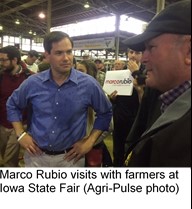WASHINGTON, Aug. 26, 2015 - Donald Trump’s immigration agenda is pushing the Republican debate well to the right and raising concerns in the agribusiness sector. Other candidates immediately started one-upping him. Neurosurgeon Ben Carson, who is running second in recent Iowa polls, said he’d consider military drone strikes on the border. Former Pennsylvania Sen. Rick Santorum suggested suspending authorization for Mexican border crossings.
 Meanwhile, candidates who are the friendliest to agricultural labor concerns, such as former Florida Gov. Jeb Bush, are struggling to gain any traction. Florida Sen. Marco Rubio, who angered conservatives by helping negotiate a bipartisan immigration bill in September, said at the Iowa State Fair that he’s still open to providing some kind of legal status to illegal immigrants, but only after a “long time has passed.” “We can’t do that until we prove to Americans that illegal immigration” is under control
Meanwhile, candidates who are the friendliest to agricultural labor concerns, such as former Florida Gov. Jeb Bush, are struggling to gain any traction. Florida Sen. Marco Rubio, who angered conservatives by helping negotiate a bipartisan immigration bill in September, said at the Iowa State Fair that he’s still open to providing some kind of legal status to illegal immigrants, but only after a “long time has passed.” “We can’t do that until we prove to Americans that illegal immigration” is under control
Much of the debate since Trump’s campaign posted his proposals has focused on his calls to end birthright citizenship and to force Mexico to pay for completing a border wall, while his proposal to make E-Verify mandatory nationwide has been portrayed in the media and among Republican pundits as a no-brainer, a requirement that could be imposed relatively painlessly.
But mandatory E-Verify has potentially far-reaching implications for agriculture, because of its heavy reliance on workers who would likely be flagged as ineligible to work. So far, farm group lobbyists have been able to keep mandatory E-Verify legislation bottled up in the House. An E-Verify bill (HR 1147) hasn’t gone anywhere since it emerged from the Judiciary Committee in March. But fending off such bills will be a lot harder if a Republican wins the White House running on a platform that includes mandatory E-Verify.
Frank Gasperini, executive vice president of the National Council of Agricultural Employers, estimates that making E-Verify checks mandatory would cost agriculture as much as half of its workforce. It’s an open secret that the documentation that many workers supply to employers is false. It might be sufficient for filing an employment documentation form called an I-9, but it’s presumed that using E-Verify would expose the documentation as false.
For an industry where labor shortages can reach 20 percent, the losses from E-Verify “would be disastrous, Gasperini says. Some farmers could presumably make up some of the losses by using the H-2A visa program to import temporary workers legally -- there is no cap on the number of visas -- but that wouldn’t help dairy producers and others who need year-round labor, Gasperini says. And while there are proposals to expand visa programs for low-skill workers, it would take years for the government to ramp them up, he said.
Mandatory E-Verify “might bolster economies in places like Canada, Mexico, and China, but it would be a disaster here,” says Craig Regelbrugge of AmericanHort, the horticultural trade group, alluding to the impact it would have on domestic production.
The shift in the GOP campaign also has implications for immigration reform in Congress.
Should Democrats take both the White House and the Senate in 2016, and the immigration issue is viewed as having hurt the GOP, they will almost certainly be emboldened to bring out another broad immigration reform bill. In that case, Republicans might “throw in the towel and take their medicine” and support an immigration bill, says Gasperini.
But it’s also possible that congressional Republicans, having run on a hardline immigration policy, would be even more resistant to the legislation than they were in 2013. If Republicans win the White House on a hard-line position, and hold the Senate and House as well, there’s going to be heavy pressure to write proposals such as mandatory E-Verify into law.
For now, the status quo is actually pretty good for agriculture. As Agri-Pulse has reported, the Obama administration has shifted immigration enforcement away from farms and other employers to focus on border security. Dairy farms, for example, aren’t having their I-9 documentation audited as frequently. Meanwhile, the administration’s proposed deferred action program that could tempt some farmworkers to look for higher paying jobs elsewhere is stalled in the courts. Those two actions are the best of both worlds for agriculture.
The Iowa caucuses are still more than five months away, which means a lot of twists and turns are still to come. But Trump is pushing the immigration issue in a direction that can only make much of agriculture nervous.
#30
For more news go to: www.Agri-Pulse.com

